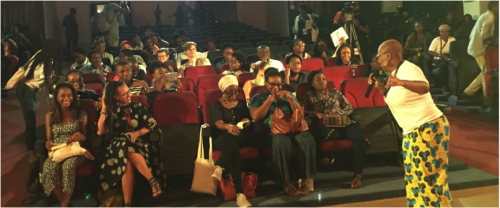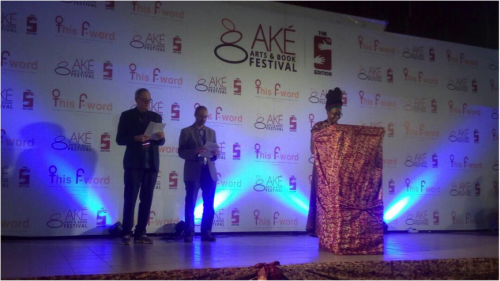
The Ake Festival happens every year in Abeokuta, a town a couple of hours from Lagos, Nigeria, in the heart of what is sometimes called Yorubaland. Wole Soyinka, one of Africa’s greatest living writers, lives near there, and he is in some ways its presiding spirit.
Lola Shoneyin, the force of nature behind the Festival organization, corrals every year a breathtaking array of writers in one place. In 2016, just as a sample, they included Ngũgĩ wa Thiong'o, Teju Cole, Helon Habila, Jennifer Nansubaga Makumbi, NoViolet Bulawayo, Tendai Huchu and Alain Mabanckou. In 2017, the Festival was devoted to the F-word –Feminism– and the guestlist included some of Africa’s greatest women writers, including Ama Ata Aidoo and Nnedi Okorafor.
The Ake Festival is wonderfully SFF-friendly. In 2016 it featured panels on on science fiction and horror, as well as the announcement of the creation of the Nommo Awards. In 2017, it hosted the first Nommo Awards ceremony, presented by Nnedi Okorafor and Tom Ilube.
 Nnedi Okorafor hosting the Nommo awards
Nnedi Okorafor hosting the Nommo awards
You can read through the whole chapter by following the “next” links at the end of each interview, or jump to a specific interview by using the links below. Start with the
Introduction. You can always return to this chapter index by clicking on the “100 African Writers of SF—Part Eight” link at the top of each interview, and return to the overall project index by clicking on the 100 African category, or clicking
here.
The Ake Festival is too much fun to write about dutifully. I want to show it to you.
“Writing about mental illness in African writing–I often find that people write from the extreme, coming from a place of lack of understanding.”
“African science fiction is on the right track. I’m seeing stuff that makes me think that
anything is possible, from District Nine to Omenana.”
“I think Africa is exploring its past, its precolonial past, let me be specific about that. We haven’t realized how much impact colonialism had on us as a people.”
“Merging ju-ju with science fiction, merging Nigerian mythology with technology and science fiction–those are my favourite things.”
“In Yoruba culture, we have the Ifa Corpus, called the Odu; a book of 256 incantations that tell stories about everything; ontologies, creation, fate, the future, fables and parables and documentations of treaties between God (Olorun) and man. Ifa is called a religion, but it’s not one really.”
“I think living in Nigeria, there is a culture here that you simply cannot understand if you’re not immersed. It’s very beautiful, it’s very vibrant but there’s also the fact that Nigeria doesn’t really work.”
“With African speculative fiction, it’s going to be a wild ride, a very wild ride. Because the elements we have to play with are limitless and relatively new.”
“Most of us grew up reading Western books, grew up on Star Wars, Star Trek, not even very hardcore science fiction, unfortunately. It’s difficult to break out of that.”
“I don’t even like the term “African Writing”. If I’m African, I’m first of all a human being and I can write. It’s a kind of pigeonholing.”
“The very first book I read that wasn’t quite mainstream was Ngugi’s (wa Thiong’o) Wizard of the Crow, and I found that I go on about that book till today.”
“Like my other stories, it’s the dream (laughs), and I think that might be why I write SF. The dreams I have and putting that together with my stories.”
"I was trying to imagine where Nigeria would be in the next hundred to hundred and fifty years. It seemed that nobody was thinking that far ahead.”
Like this:
Like Loading...
 The Ake Festival happens every year in Abeokuta, a town a couple of hours from Lagos, Nigeria, in the heart of what is sometimes called Yorubaland. Wole Soyinka, one of Africa’s greatest living writers, lives near there, and he is in some ways its presiding spirit.
Lola Shoneyin, the force of nature behind the Festival organization, corrals every year a breathtaking array of writers in one place. In 2016, just as a sample, they included Ngũgĩ wa Thiong'o, Teju Cole, Helon Habila, Jennifer Nansubaga Makumbi, NoViolet Bulawayo, Tendai Huchu and Alain Mabanckou. In 2017, the Festival was devoted to the F-word –Feminism– and the guestlist included some of Africa’s greatest women writers, including Ama Ata Aidoo and Nnedi Okorafor.
The Ake Festival is wonderfully SFF-friendly. In 2016 it featured panels on on science fiction and horror, as well as the announcement of the creation of the Nommo Awards. In 2017, it hosted the first Nommo Awards ceremony, presented by Nnedi Okorafor and Tom Ilube.
The Ake Festival happens every year in Abeokuta, a town a couple of hours from Lagos, Nigeria, in the heart of what is sometimes called Yorubaland. Wole Soyinka, one of Africa’s greatest living writers, lives near there, and he is in some ways its presiding spirit.
Lola Shoneyin, the force of nature behind the Festival organization, corrals every year a breathtaking array of writers in one place. In 2016, just as a sample, they included Ngũgĩ wa Thiong'o, Teju Cole, Helon Habila, Jennifer Nansubaga Makumbi, NoViolet Bulawayo, Tendai Huchu and Alain Mabanckou. In 2017, the Festival was devoted to the F-word –Feminism– and the guestlist included some of Africa’s greatest women writers, including Ama Ata Aidoo and Nnedi Okorafor.
The Ake Festival is wonderfully SFF-friendly. In 2016 it featured panels on on science fiction and horror, as well as the announcement of the creation of the Nommo Awards. In 2017, it hosted the first Nommo Awards ceremony, presented by Nnedi Okorafor and Tom Ilube.
 Nnedi Okorafor hosting the Nommo awards
Nnedi Okorafor hosting the Nommo awards